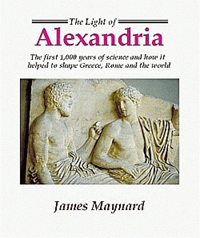

|
 |
 |
2007 February 21
|
Please go to the new Coffee Coaster site implemented more gracefully in Wordpress. This page @ http://brianrwright.com/CoffeeCoasterBlog/?p=5366 |
2005, Lulu, 171 (big) pages
It's a real kick for me to review this fine work of art by a new friend of mine in the Free State. In fact, James is the one who suggested I investigate publishing my own book, New Pilgrim Chronicles, using the independent publisher Lulu.
Although Light reaches a general audience of any educational level, say, beyond junior high school, it's going to be more appreciated by those of us who went through some college prerequisites. Back when I was a freshman and when CliffsNotes was young, I recall the Socratic dialogs.
Then later I learned something about Plato, Aristotle, Hippocrates, Pythagoras, Euclid, and the names of perhaps a couple of dozen more Greeks, Romans, and other great ones from the cradle of civilization. Problem is all my knowledge of that era was and is fragmented and I never understood the sequence of the lives. Until now.
Maynard fills in the gaps.
Not only does he give us the technical details of the hydromechanical discoveries of Archimedes or the heliocentric astronomy of Aristarchus, he writes of the special agriculture of olive trees and the art, literature, music, customs, and even the humor of the times. One comes away with a sense of immense vitality of these people, and relevance to our own era. Maynard gives us people we'd like to chew the fat with.
His approach is to more or less walk through the significant thinkers and artists from six or seven centuries BCE (before the Christian era, what used to be BC) to
the bitter end, with the brutal Christian-gang killing of Hypatia of Alexandria in 415 CE (in the Christian era, what used to be known as AD).
Mr. Maynard shares his thoughts and discoveries in language that the layperson feels comfortable with. I wish he had included an index, especially for a book so rich in people and places, but perhaps that will be forthcoming in revision 2?
What makes this book unique is that all ages will tend to become enthralled
by a subject matter that is normally as dry as chapped skin. I'm glad to have purchased it, because if I'm curious about a particular person, the information is packaged in a modular way that gets me in and out quickly with a smile of understanding on my face.
I do wish to comment again on Hypatia. The author features this intelligent, beautiful woman—the last of the directors of the Great Library at Alexandria—on the frontispiece and again (I think) on the back cover. Indeed, since the book covers the whole of the Mediterranean origins of civilization, she seems to be a large reason for the book title, itself.
Anyway, I had not known that specific story of her rise and fall. The Christian era was coming into full swing, and she held ideas that
challenged its core superstitions. Plus, as a beautiful and intelligent woman, she no doubt frightened the sexually insecure Talibanistas of her day, who inflamed the mob and horribly killed her.
For me personally, this treatment of Hypatia inserts another sturdy nail in the coffin of fundamentalist-Christian unreason. Plus, now I have another heroine, Hypatia, truly the "light of Alexandria," to nourish my heart and soul when times are tough.
Thanks, James. Magnifico.

| Go to Alexandria |  |
 |
||